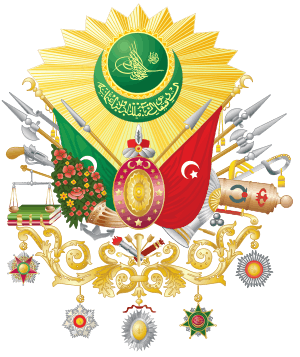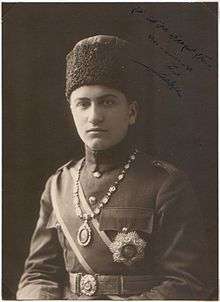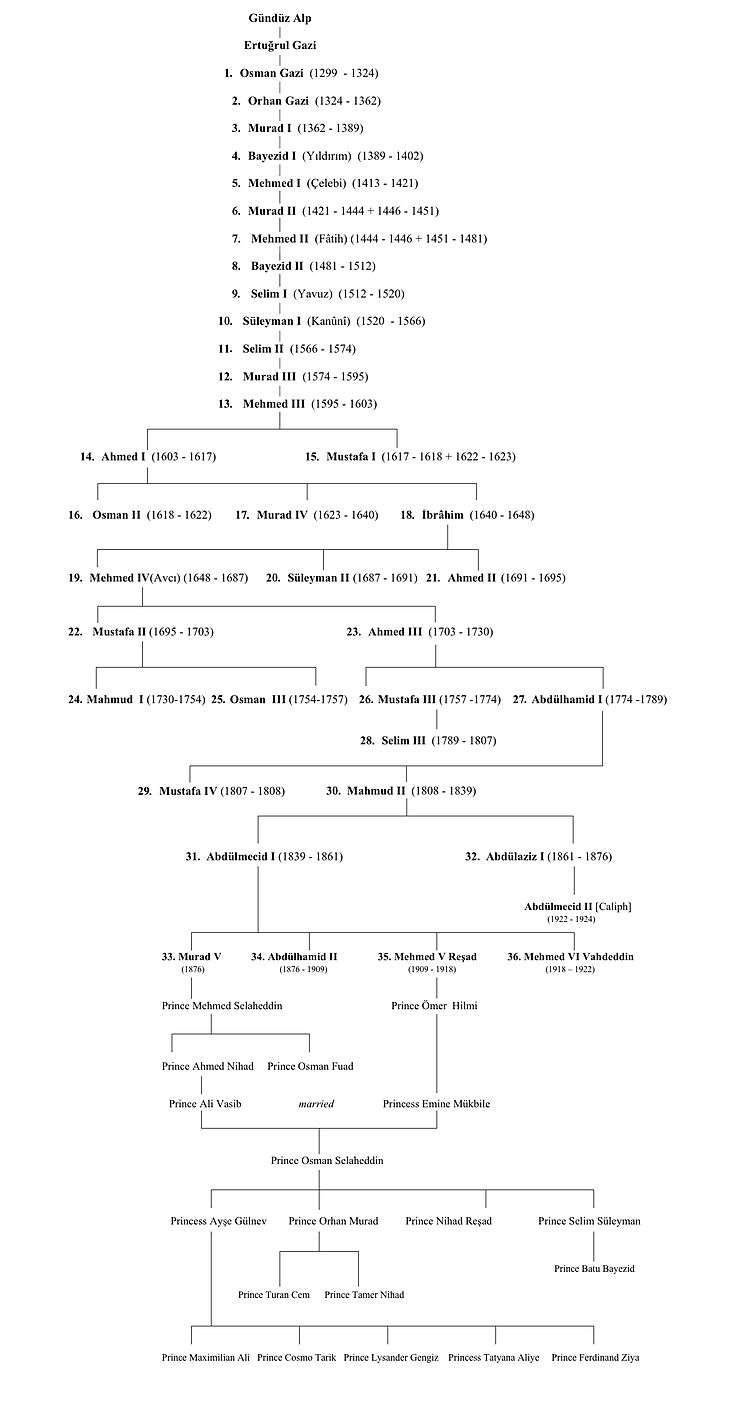Ali Vâsib
| Ali Vâsib | |
|---|---|
| Prince Ali Vâsib | |
 | |
| Head of the House of Osman | |
| Term | 19 January 1977 – 9 December 1983 |
| Predecessor | Mehmed Abdulaziz |
| Successor | Mehmed Orhan |
| Born |
14 October 1903 Beşiktaş, Istanbul (Constantinople), Ottoman Empire |
| Died |
9 December 1983 (aged 80) Alexandria, Egypt |
| Spouse | Emine Mükbile Sultan |
| Issue | Osman Selaheddin Osmanoğlu |
| House | Imperial House of Osman |
| Father | Ahmed IV Nihad |
| Mother | Safiru Hanım |
| Religion | Sunni Islam |
| Imperial Ottoman Dynasty | |
|---|---|
 | |
| Country | Ottoman Empire |
| Founded | 1299 |
| Founder | Osman I |
| Dissolution | 1922 |
Ali Vâsib (13 October 1903, Constantinople – 9 December 1983, Alexandria) was an Ottoman prince. From 1977 to his death in 1983, he was the 41st head of the Imperial House of Osman, an Ottoman royal dynasty.[1][2][3][4] Much of his life was spent in exile.
Family
Vâsib was born in Çırağan Palace, Ortaköy, Beşiktaş, the only son of Ahmed Nihad, the 38th head of the Imperial House of Osman and Her Highness, Safiru Hanım. Murad V, the 33rd head of the House of Osman, was Vâsib's great grandfather.[5][6][7]
Marriage
On 24 April 1931, (or on 30 November 1931), Vasib married his distant cousin Emine Mükbile Sultan, at the Ruhl Hotel, Nice, France. Emine, (17 September 1911, Dolmabahçe Palace – 21 May 1995, Istanbul) was the only daughter of Şehzade Ömer Hilmi and Gülnev Hanım. Emine Mükbile was the granddaughter of Sultan Mehmed V, 35th head of the House of Osman.
Son
Vasib had one son, Osman Selaheddin Osmanoğlu (born 7 July 1940, Alexandria). He was educated at Victoria College, Alexandria. He became a member of the Institute of Chartered Accountants of London. On 27 August 1966, Osman Selaheddin married Athena Joy Hanım née, Christoforides (born 9 March 1944, London). They have three sons and one daughter and grandchildren.[8][9]



Education and career
Vasib was educated at the Galatasaray and Harbiye Colleges in Istanbul. He attained the rank of Lieutenant in the Ottoman army infantry. He achieved the "Collar of the Hanedan-ı-Ali-Osman" and the "Mecidi Nişan", 1st class.
House arrest
Vasib spent his first year of life at the Çırağan Palace, Ortaköy, Istanbul, Turkey. From 1876, the Ciragan palace served as a place of house arrest for Murad V and his family. In that year, Murad was deposed from the role of Sultan by his brother, Abdülhamid. The restrictions imposed on the former Sultan and his family were not lifted until Murad's death in 1904. Vasib lived in Istanbul until March 1924.
Exile
After the formation of the republic of Turkey in 1923 and the abolition of the Ottoman Sultanate and the Caliphate in the following year, Vasib and other members of his family were forced into exile.[10] They left Istanbul from Sirkeci railway station. Vasib lived in Budapest for a few months, before settling in Nice, France. Other family members moved to the South of France and to Italy, including Vahideddin, (Mehmed VI) who went to San Remo; and Abdulmecid, (Vasib's cousin and the last Caliph) to Nice, after a short time in Switzerland.
French passports
The travel documents issued by the Turkish Republic to the members of the House of Osman on their exile were valid for only one year. Vasib intervened with the French government to obtain passports for them. Vasib made contact with the French minister, Count Castellane through General Toulouse and his son, Captain Toulouse, who was a friend. The French passports listed the family as having Ottoman nationality and acknowledged their imperial titles.
Alexandria
In January 1935, Vasib moved to Alexandria, Egypt with his wife and her family. For the next 18 years, Vasib was the director of the director of the Antoniadis Palace, which served to accommodate foreign heads of state and dignitaries visiting Alexandria.
Later years
Vasib was permitted to return to Turkey in 1974. From that time, he visited annually and his wife lived in a humble rented flat in the old part of the city near Sultan Ahmed Square. Vasib's memoirs have been published in Turkish. Vasib's son, Osman Selaheddin, transcribed the work from Arabic to a Latin script.
Succession
On 19 January 1977, following the death of his cousin, Mehmed Abdülaziz, Vasib became head of the House of Osman. Had Vâsib become the reigning sultan, he would have been "Sultan Ali I".
Death
On 9 December 1983, in Alexandria, Vasib died from a stroke. He was 80. He was buried in Alexandria and later his remains were moved to Sultan Reşad Mausoleum, Eyüb. At the time of his death, he was the oldest living Ottoman prince. On his death, the Monarchist League wrote:"Prince Ali Vasib will be remembered as a man of great charm. His ease of manner and his gifts as a raconteur were the hallmarks of one of the last of the grands seigneurs of the Gotha."
Family tree

References
- ↑ Almanach de Gotha, 184th edition, pg 365, 912–915. Almanach de Gotha. (2000).
- ↑ Burke's royal families of the world. Second edition. pg 247. Burke's peerage. (1980).
- ↑ "The Ottoman empire". History Files.
- ↑ Official website of the immediate living descendants of the Ottoman dynasty. Accessed 20 July 2012.
- ↑ Genealogy of Ali Vasib.
- ↑ Genealogy of Turkish royalty. Accessed 20 July 2012.
- ↑ Family history of Mahmud II Retrieved 20 July 2012.
- ↑ kitap.antoloji.com. Accessed 20 July 2011.
- ↑ Bir Şehzadenin Hâtırâtı. Osmanoğlu, Osman Selaheddin. Yapı Kredi Yayınları. (2003) Turkey. ISBN 975-08-0878-9 OCLC 469568294.
- ↑ Renaming of Constantinople to Istanbul, 1930. Accessed 20 July 2012.
| Ali Vâsib Born: 13 October 1903 Died: 9 December 1983 | ||
| Titles in pretence | ||
|---|---|---|
| Preceded by Mehmed Abdulaziz |
— TITULAR — Sultan of the Ottoman Empire 19 January 1977 – 9 December 1983 Reason for succession failure: Empire abolished in 1922 |
Succeeded by Mehmed Orhan |